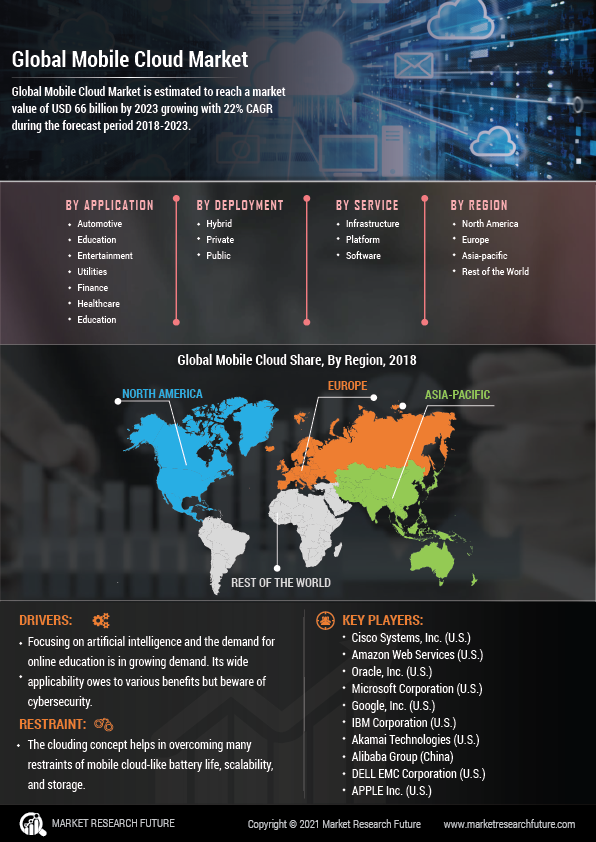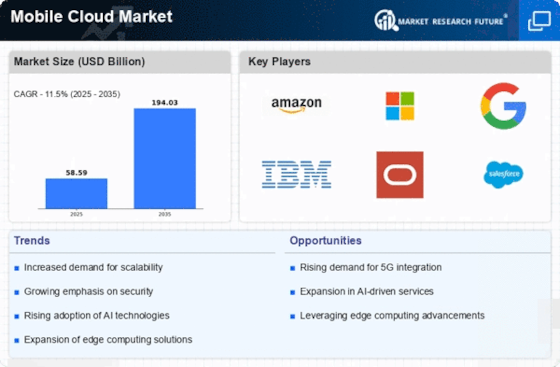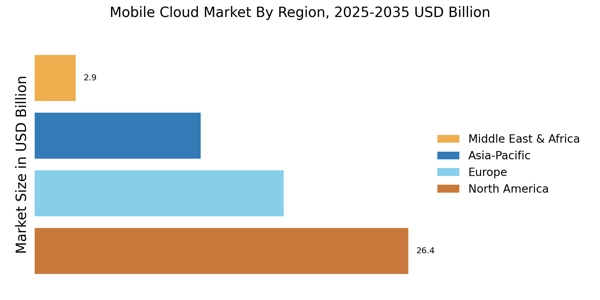Growing Emphasis on Cost Efficiency
Cost efficiency remains a pivotal driver in the Mobile Cloud Market, as organizations seek to optimize their operational expenditures. The shift towards mobile cloud solutions allows businesses to reduce infrastructure costs associated with traditional IT setups. By leveraging cloud services, companies can scale their resources according to demand, thereby minimizing waste and maximizing efficiency. Recent studies indicate that organizations adopting mobile cloud solutions can achieve cost savings of up to 30% compared to on-premises systems. This financial incentive is compelling for businesses of all sizes, prompting a broader adoption of mobile cloud technologies. The Mobile Cloud Market is thus likely to continue expanding as more organizations recognize the economic benefits of transitioning to cloud-based solutions.
Expansion of Internet of Things (IoT)
The proliferation of the Internet of Things (IoT) is significantly influencing the Mobile Cloud Market. With billions of devices connected to the internet, the need for efficient data management and processing has never been more critical. IoT devices generate vast amounts of data that require cloud-based solutions for storage and analysis. The Mobile Cloud Market is poised to capitalize on this trend, as businesses seek to harness IoT data for actionable insights. Reports suggest that the number of connected IoT devices could exceed 30 billion by 2025, further driving the demand for mobile cloud services. This expansion presents opportunities for mobile cloud providers to offer tailored solutions that cater to the unique needs of IoT applications, thereby enhancing their market presence.
Rising Demand for Mobile Applications
The Mobile Cloud Market is experiencing a surge in demand for mobile applications, driven by the increasing reliance on smartphones and tablets for everyday tasks. As businesses seek to enhance customer engagement and streamline operations, mobile applications have become essential tools. According to recent data, the number of mobile app downloads is projected to reach over 250 billion by 2025, indicating a robust growth trajectory. This trend necessitates the integration of cloud services to support app functionality, storage, and scalability. Consequently, mobile cloud solutions are being adopted to ensure seamless performance and user experience. The Mobile Cloud Market is thus positioned to benefit from this growing demand, as developers and enterprises increasingly leverage cloud capabilities to deliver innovative mobile applications.
Advancements in Network Infrastructure
The Mobile Cloud Market is benefiting from advancements in network infrastructure, particularly with the rollout of 5G technology. The enhanced speed and reliability of 5G networks facilitate seamless connectivity and data transfer, which are crucial for mobile cloud applications. This technological evolution is expected to drive the adoption of mobile cloud services, as users demand faster and more efficient solutions. With 5G, latency is significantly reduced, enabling real-time data processing and improved user experiences. The Mobile Cloud Market is likely to see increased investment in cloud solutions that leverage 5G capabilities, positioning providers to meet the growing expectations of consumers and businesses alike.
Increased Focus on Data Security and Compliance
As data breaches and cyber threats become more prevalent, the Mobile Cloud Market is witnessing an increased focus on data security and compliance. Organizations are prioritizing the protection of sensitive information, leading to a demand for mobile cloud solutions that offer robust security features. Regulatory frameworks, such as GDPR and CCPA, require businesses to implement stringent data protection measures, further driving the need for secure mobile cloud services. The Mobile Cloud Market is adapting to these challenges by developing advanced security protocols, encryption methods, and compliance tools. This emphasis on security not only helps organizations mitigate risks but also enhances customer trust, which is vital for the sustained growth of the mobile cloud sector.

















